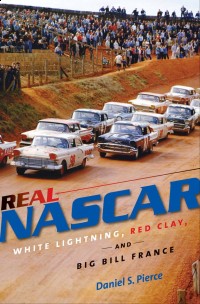From the UNCA News Service:
UNC Asheville Professor Releases Landmark Book on History of NASCAR
How did NASCAR evolve from moonshine running and dirt tracks to a billion dollar industry and the biggest spectator sport in the United States? A new book by Daniel S. Pierce, University of North Carolina at Asheville associate professor of history, takes an unprecedented look into NASCAR’s history and reveals a story that racing fans and Southern historians alike will find compelling.
“Real NASCAR: White Lightning, Red Clay, and Big Bill France” (UNC Press, April 2010) examines the sport from its postwar beginnings on Piedmont North Carolina dirt tracks and Daytona Beach dunes through the early 1970s when the sport spread beyond its southern roots and gained national recognition. And in a fascinating and controversial twist, Pierce also confirms the popular notion of NASCAR’s origins in bootlegging and establishes beyond a doubt the close ties between organized racing and the illegal liquor industry.
Though Pierce grew up within earshot of the former Asheville Speedway, he didn’t fall in love with NASCAR until a college roommate urged him to attend a race at Bristol Motor Speedway in 1994. Pierce was an instant convert and has since interwoven his passion for the sport with his profession in studying Southern history.
The two are absolutely complimentary, Pierce argues, but finding facts for the book wasn’t always straightforward. “I’ve discovered that much of what has passed for history is simply not true. I had to go through lots of local newspapers and racing publications to separate fact from fiction.”
He also put in countless hours talking with the founding fathers of the sport. Pierce started collecting interviews for “Real NASCAR” more than 10 years ago. The book includes conversations with Ned Jarrett, Humpy Wheeler, Bobby Isaac, Junior Johnson and Big Bill France himself, among many others.
Perhaps the most compelling part of the book is the confirmation that racing had early ties to moonshining. “When I first started doing research on NASCAR, I thought I would prove that the whole moonshine connection was overblown and exaggerated,” said Pierce. “As I put it in the introduction, however, ‘The deeper I looked, the more liquor I found.’ Bootleggers and moonshiners were at the very core of early Piedmont stock car racing and the early days of NASCAR. The illegal industry not only provided the most talented and successful drivers, but the best mechanics, car owners, promoters and race track builders and owners.”
Moonshine and fast cars were a natural way to draw students into studying history, said Pierce, who has offered a class on NASCAR and involved students in the research process for “Real NASCAR.”
Those students who worked alongside Pierce found that he is not the archetypical tweed-wearing college professor. For instance, he has the whole side of a Dodge Challenger previously driven by Dave Blaney bolted to his office wall. “I think I can safely say it’s the only such display in an academic office in America,” Pierce laughed. “I also have a Dale Earnhardt Sr. sticker on my 1990 Ford Ranger truck, and I’m not ashamed to say that I cried when he died.”
Pierce, an Asheville native, holds a doctorate in history from the University of Tennessee. A noted NASCAR historian, Pierce has written widely on the topic, including encyclopedia articles and an entry on “The Most Southern Sport on Earth: NASCAR and the Unions” for the Journal of Southern Culture. He also detailed the sport’s bootlegging past for a History Channel special on Appalachian history. Pierce is also the author of “The Great Smokies: From Natural Habitat to National Park,” which was the inaugural selection for Tennessee Reads, a book club featuring titles from the University of Tennessee Press.
For more information or to read and excerpt from “Real NASCAR,” visit http://uncpress.unc.edu/books/T-5676.html.






If you like this article you should also check out my Google map of nearby dirt tracks and go to a race. We should bring a track back to the Asheville area – total family friendly fun.
Map:
http://maps.google.com/maps/ms?ie=UTF8&hl=en&msa=0&msid=101814633281212578634.00046cbfab0d0dcc6fc0f&z=7
Race schedule for some events (big ones):
http://en.wikipedia.org/wiki/Lucas_Oil_Late_Model_Dirt_Series
Some photos:
http://www.flickr.com/search/?q=dirt track&w=95742421@N00